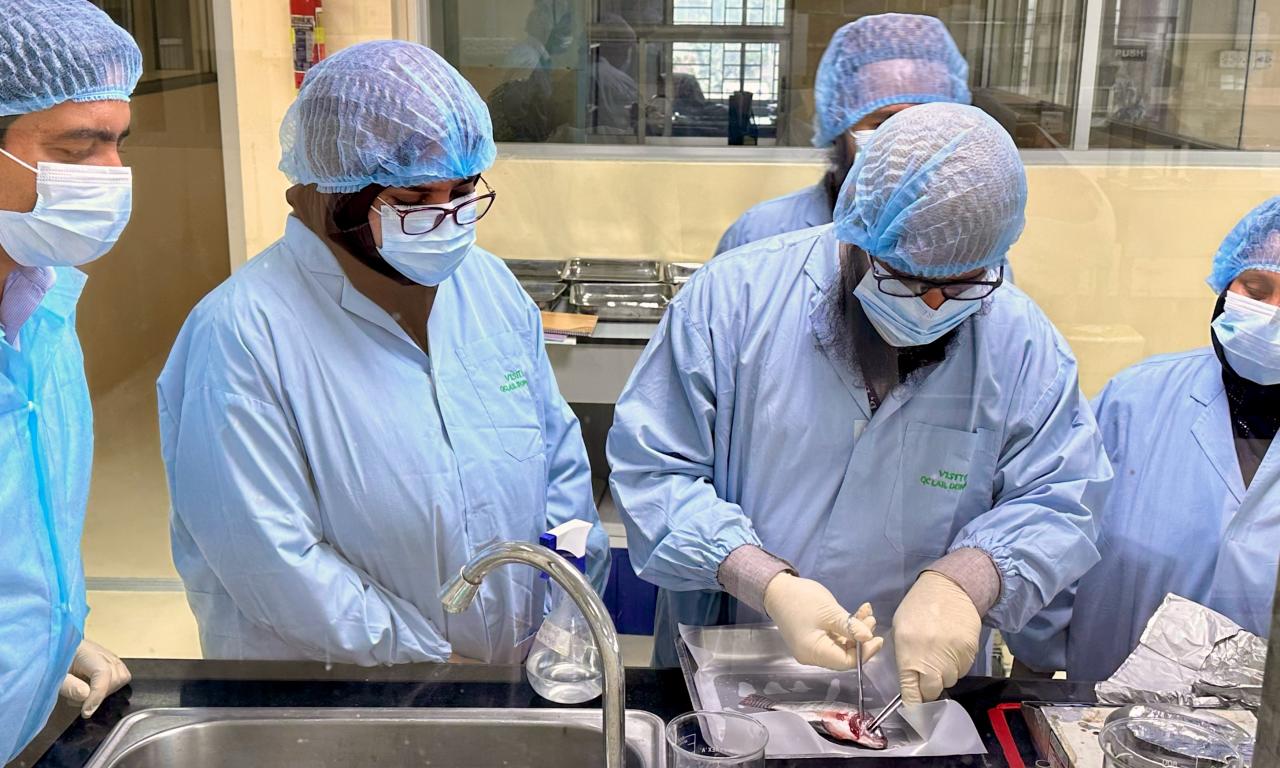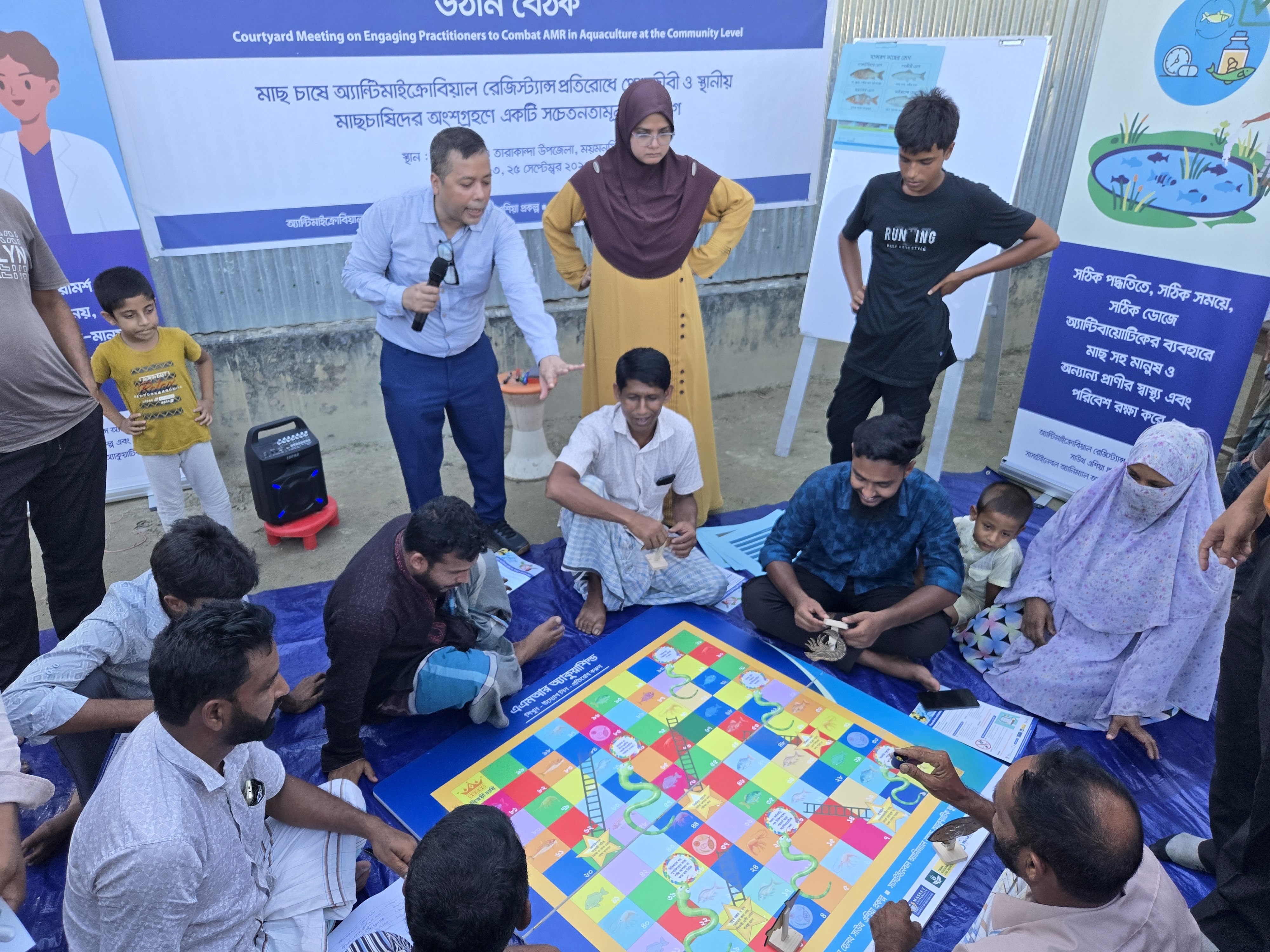
- WorldFish leads regional efforts to combat antimicrobial resistance (AMR) in aquaculture across four South Asian countries: Bangladesh, Pakistan, Nepal, and Sri Lanka.
- AMR and antimicrobial use (AMU) surveillance systems are being strengthened, alongside enhanced laboratory capacity, supporting evidence-based decisions and enabling targeted government actions to reduce AMU/AMR risks.
- Key aquaculture stakeholders are engaged in promoting responsible AMU and improving biosecurity practices in aquaculture.
Antimicrobial resistance (AMR) is a growing global concern that threatens public health, food safety, and the sustainability of aquaculture systems. In aquaculture, resistant bacteria and genes can spread rapidly through water, compromising fish health, reducing farm productivity, and threatening food safety and public health. Misuse and overuse of antimicrobials accelerate this process.
Supported by the UK Department of Health and Social Care’s Fleming Fund through the Antimicrobial Resistance and One Health - South Asia (AMROH-SA) Regional Grant and CGIAR’s Sustainable Animal and Aquatic Foods (SAAF) program, WorldFish is enabling competent authorities to develop AMU and AMR surveillance systems, and engaging practitioners to promote responsible antimicrobial use (AMU) practices in aquaculture in South Asia. This work is part of WorldFish’s collaborative efforts in 2025, focusing on mitigating the risks of AMR in aquaculture through evidence-based interventions and capacity strengthening.
Strengthening AMR/AMU Surveillance Systems
AMU and AMR surveillance are critical components for safeguarding animal, human, and environmental health. By monitoring patterns of AMU and tracking resistant microorganisms and their transmission pathways, these surveillance systems enable early detection of emerging threats, support evidence-based treatment and management decisions, and inform targeted regulatory and stewardship actions.
WorldFish is contributing to regional AMR initiatives in Bangladesh, Pakistan, Nepal, and Sri Lanka, fostering knowledge exchange, harmonizing AMU and AMR surveillance protocols for aquaculture, and building a collaborative framework for a One Health-based AMR containment approach.
Building Laboratory and Technical Capacity
Laboratory and technical capacity development is important to produce reliable data and support effective, evidence-based decision-making. To support national AMR surveillance systems, WorldFish organized laboratory training programs in Bangladesh in 2025. Department of Fisheries (DOF) officials received hands-on sessions on aquatic sample collection, processing, transportation, and necropsy procedures. These trainings aimed to enhance national laboratory capacity for AMR surveillance in aquatic systems in Bangladesh.
Promoting Antimicrobial Stewardship
Antimicrobial stewardship (AMS) in aquaculture is an evidence-based approach that promotes responsible AMU through robust biosecurity, accurate diagnosis, and alternatives such as vaccines and probiotics, while minimizing the development and spread of AMR.
To strengthen AMS in Bangladesh, WorldFish hosted the practitioner engagement program (PEP) in a major aquaculture hub, engaging farmers, prescribers, and input sellers through interactive sessions and an innovative interactive game, linking biosecurity and best practices to safer, more sustainable aquaculture. In addition, WorldFish is conducting a scoping study and stakeholder consultations on vaccines and alternative treatments to identify effective solutions for disease prevention and AMR containment.

Moving Forward
Through coordinated research, training, partnerships, and community engagement, WorldFish is advancing the One Health approach to address AMR challenges in aquaculture across South Asia. By strengthening laboratory capacity and empowering communities, WorldFish and its partners aim to safeguard food safety, public health, and sustainable aquatic food systems for future generations. In line with the theme of this year's World AMR Awareness Week 2025, “Act Now: Protect Our Present, Secure Our Future,” these efforts highlight the urgent need for collective action against AMR.


